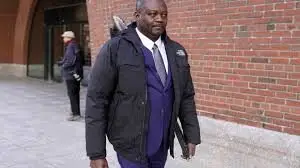A former mayor from Haiti who hid a brutal history of political violence to settle quietly in America will spend the next nine years in a federal prison, the U.S. Department of Justice announced Friday.
Jean Morose Viliena, 53, once ruled the coastal commune of Les Irois with an armed gang loyal to the Korega political machine. Trial evidence showed he ordered—or personally carried out—killings, beatings and armed crackdowns on critics between 2006 and 2010. Yet when he appeared at the U.S. embassy in Port-au-Prince in 2008, Viliena ticked “no” next to the visa form’s question about involvement in extrajudicial violence.
That lie secured him a visa, then a U.S. green card, and ultimately a comfortable life in Massachusetts—until federal investigators pieced together witness testimony and brought charges. A Boston jury convicted him in March of three counts of immigration fraud; Chief Judge F. Dennis Saylor IV imposed the nine-year sentence and three years of supervised release.
“Human-rights abusers cannot treat the United States as a sanctuary,” said Matthew R. Galeotti, who heads the Justice Department’s Criminal Division. “If you lie your way in, we will find you and prosecute you.”
U.S. Attorney Leah B. Foley called Viliena’s American chapter “a decade-long masquerade.” While the former mayor prospered, she said, “his Haitian victims lived in fear, exile and pain.”
Violence in Haiti
- July 27, 2007: Witnesses testified Viliena led a gun-wielding posse to an activist’s home, fatally shot the man’s teenage brother, then crushed the victim’s skull with a rock in front of onlookers.
- April 2008: He and armed supporters stormed a community radio station that criticized him, distributing firearms and machetes. One man was beaten and shot—his leg later amputated; another was struck by a bullet that left him blind in one eye.
Fraud in the United States
Less than two months after the radio-station raid, Viliena filed his U.S. visa application, swearing he had never participated in political killings. The falsehood paved his path to lawful permanent residence, steady employment, and the birth of a U.S.-citizen son.
“Viliena’s deception attacked the integrity of our immigration system,” said Michael J. Krol, Special Agent in Charge of Homeland Security Investigations in New England. “No matter where the crimes occurred, HSI and its partners will hold offenders to account.”
What Happens Next
Viliena will serve his sentence in federal custody before possible removal from the United States. Meanwhile, human-rights prosecutors say the case signals an aggressive stance toward foreign officials who hide violent pasts to gain entry:
“The message is unambiguous,” Foley said. “America is not a refuge for those who muzzle dissent with bullets and machetes.”
For the victims in Les Irois, Friday’s judgment offers a measure of closure—proof that, even years later and thousands of miles away, truth can outrun impunity.






